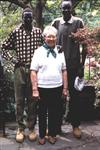Fictive kin is another kind of extended family
Many African immigrants replace their absent extended family with “fictive kin,” members of the same ethnic or national community who play the role that family would at home. Community members may counsel young people, mediate during domestic conflict, provide moral and financial support at times of crisis or death, and help celebrate joyous events such as weddings, births, and graduations.
Southern Sudanese boys in Kakuma, a refugee camp in Kenya, created fictive “families” while they lived there for many years. Some of these Sudanese boys have now been resettled in Philadelphia with foster families, also a kind of fictive kin. Describing her foster sons, Louise Shoemaker commented, “They call me ‘mother.’ But any woman who is nice to them they call ‘mother.’”
Many African immigrants are single men or men who have left their families at home. These men may feel very isolated in the United States without their relatives and extended family network. Spending time with co-ethnics or co-nationals helps them to recreate the home context and to recover some of their identity.

